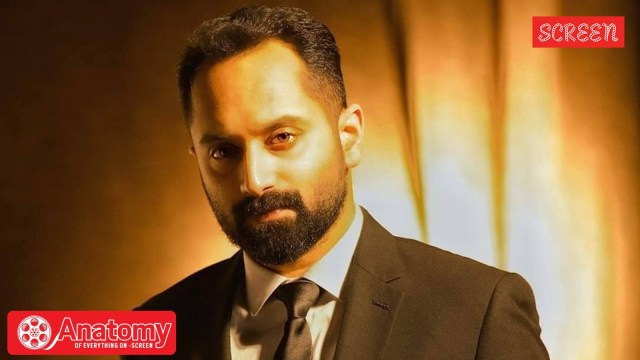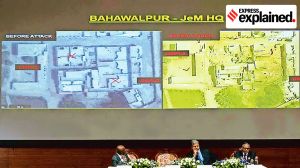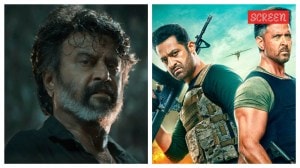Click here to follow Screen Digital on YouTube and stay updated with the latest from the world of cinema.
Fahadh Faasil once pulled a Mohanlal, changing the trajectory of his career in one year, and winning his first Kerala State Film Award for Best Actor
Coincidentally, both Mohanlal and Fahadh Faasil, about three decades apart, changed the trajectory of their respective careers in just one year, delivering extraordinary performances in diverse characters.
 Fahadh Faasil celebrated his 43rd birthday on August 8. (Credit: Facebook/@FahadhFaasil)
Fahadh Faasil celebrated his 43rd birthday on August 8. (Credit: Facebook/@FahadhFaasil)As tedious and soap opera-ish as the whole movie may be, one may not give up on director Sudheesh Sankar’s Maareesan midway, and that’s because of the spectacular on-screen chemistry between Fahadh Faasil and Vadivelu. Despite belonging to different generations, speaking varied mother tongues, and not sharing many similarities in their acting styles, it felt as though they could blend effortlessly with each other. While the film careened aimlessly as it progressed, Fahadh and Vadivelu offered viewers some respite with their in-sync performances, as if they were traversing a parallel route in a different dimension.
Since he is a veteran who has proven his prowess in roles of varied depth and flavour, this level of brilliance was expected from Vadivelu. But in Maareesan, Fahadh demonstrated that he has joined the ranks of such legends who can ensure top-quality performance, even while all other facets of the project are tottering. And what makes his ascent to this league even more intriguing is that his debut in Kai Ethum Dhoorathu (2002) can be dubbed as one of the worst maiden performances ever in Malayalam cinema. Between Fahadh Faasil making his debut as one of the most hopeless and untalented nepo kids, and eventually becoming one of the finest actors of his generation in the country, we all grew up, and so did the film industry.
Although it’s senseless to compare Fahadh with Malayalam legend Mohanlal, particularly owing to the range of characters and emotionally resonant performances the superstar pulled off in his initial decade alone, positioning him leaps and bounds ahead of any of his successors, there’s one rather intriguing similarity between their journeys. Of course, this wasn’t planned and nor can it be, since it’s not in their hands alone. However, coincidentally, as they were powering through in the industry, about three decades apart, both Mohanlal and Fahadh changed the trajectory of their respective careers in just one year, delivering extraordinary performances in diverse characters.
At 26, by which time he had already established himself as one of the most prominent young actors out there, Mohanlal hit top gear and appeared in about 34 films in 1986. Besides playing the lead or one of the central characters in all these movies, he also showcased his growth as an actor since his debut in Manjil Virinja Pookkal. From the classic romance Namukku Parkkan Munthirithoppukal, mystery thriller Kariyilakkattupole, gangster dramas Rajavinte Makan and Shobhraj, intense dramas Panchagni and Deshadanakkili Karayarilla, and tragedy Ninnishtam Ennishtam, to the comedy Mazha Peyyunnu Maddalam Kottunnu, comedy thriller Hello My Dear Wrong Number, satirical comedy-drama Doore Doore Oru Koodu Koottam, and comedy dramas Sanmanassullavarkku Samadhanam, TP Balagopalan MA, Gandhinagar 2nd Street and Thalavattam, Mohanlal not only showcased his versatility by taking on a wide range of roles, but also delivered outstanding performances in every film. Besides bagging his first Kerala State Film Award for Best Actor for TP Balagopalan MA, the year also witnessed Mohanlal’s ascent to superstardom with Rajavinte Makan.
In 2013, Fahadh Faasil’s career also witnessed a similar boom, as he showcased phenomenal growth as an actor, almost completely erasing the memory of his debut disaster from the minds of moviegoers. Despite impressing audiences with his post-hiatus performances in movies like Kerala Café (2009), Cocktail (2010), Chaappa Kurishu (2011), 22 Female Kottayam (2012), Diamond Necklace (2012) and Friday (2012), none of them truly proved that he was a class apart. At best, they simply showed that he’s a valuable addition to Malayalam cinema’s long list of talented performers. However, the underused actor in him, brimming with skills he had acquired over the years, waited like a caged bird, yearning to spread its wings and soar. 2013, nonetheless, marked a turning point in his career. In the 12 films that he appeared in that year, Fahadh knocked it out of the park in almost all roles, proving that he’s a league of his own. Even in movies where he played only supporting roles, and that too in the ones headlined by superstar Mohanlal and Mammootty, Fahadh managed to leave a lasting impression.
 Fahadh Faasil and Andrea Jeremiah in Rajeev Ravi’s Annayum Rasoolum. (Credit: IMDb)
Fahadh Faasil and Andrea Jeremiah in Rajeev Ravi’s Annayum Rasoolum. (Credit: IMDb)
In Rajeev Ravi’s modern romantic classic Annayum Rasoolum, he played the male lead Rasool, a working-class Muslim man belonging to one of the lowest social classes, in a pitch-perfect manner, stripping the character of unnecessary theatrics and anchoring him in the realistic backdrop of Kochi. In this new-era retelling of Romeo and Juliet, Fahadh’s performance was not only subtle but also often transcended what was written on the page.
In Rasool’s life without a compass, Anna (Andrea Jeremiah) arrived like a gentle breeze, stroking the seemingly calm waters of his existence. While in most other parts of the movie, Fahadh ensured that his performance showed Rasool was living on autopilot, with the only instances of him relishing life being when with his friends; around Anna, his expressions and body language showcased a sense of serenity as if the waves in him yearned to graze the shore that’s her and revel in her love. While many actors often rely solely on dialogues and situations to dictate their performances, with continuity usually in dialects alone, Fahadh’s approach of giving Rasool a distinct characterisation and maintaining that throughout felt fresh. He not only delved deeply into the character’s complexities, showcasing nuances that felt authentic, but also revealed his untapped potential as an actor here.
Watch SCREEN’s exclusive interview with Divya Dutta here:
In VK Prakash’s Natholi Oru Cheriya Meenalla, on the other hand, he took the concept of layered performances to another level by effortlessly transitioning between the various mindsets of the same character, depending on the narrative’s demands. From Preman’s vulnerability, helplessness, ambitions and dark desires, to his attempts to realise them through his un/real alter-ego Narendran, Fahadh masterfully showed the different shades of the character, highlighting his ability to understand his roles intimately.
Although his portrayal of Comrade Anoop in Salam Bappu’s Mohanlal-led Red Wine was equally compelling, here he adopted a distinct acting style here, focusing more on the character’s public persona, rather than exploring its deeper layers. Since most of his scenes were flashbacks narrated or recollected by other characters, Fahadh cleverly ensured that his portrayal only reflected their understanding of Anoop and not the actual Anoop. Regardless of this apt surface-level performance, he did not overlook the socio-economic context surrounding the character and stayed true to Anoop’s essence.
 Fahadh Faasil and Swathi Reddy in Lijo Jose Pellissery’s Amen. (Screenshot: YouTube/apimalayalam)
Fahadh Faasil and Swathi Reddy in Lijo Jose Pellissery’s Amen. (Screenshot: YouTube/apimalayalam)
In Lijo Jose Pellissery’s musical romantic comedy Amen, Fahadh redefined on-screen masculinity by portraying a vulnerable hero for whom only a miracle can change his fortunes. He ensured that the character of Solomon lacked any conventional, patriarchal-approved masculine traits. Aligning with Solomon’s character arc, which positioned him neither as a headman nor a prominent figure in the village — but merely someone perceived as a “loser” with musical aspirations — Fahadh presented a fresh take on vulnerability in male characters. Considering that most previous similar characters in Malayalam had mental health issues or neurodevelopmental conditions to “justify” their lack of masculinity, Solomon in Amen was a fresh revelation for the audience, as he was simply a man who did not conform to conventional masculine ideals. And yet, a seemingly alpha woman, Shoshanna (Swathi Reddy), fell for him, redefining romance as well. As a person, he wasn’t scared to cry, admit his failures and step back when he has nothing to contribute. By weaving together these facets of Solomon, Fahadh delivered an outstanding performance that matched the film’s overall brilliance.
In Mammootty’s Immanuel (2013), Fahadh portrayed a “cunning” insurance company manager who must be perpetually cold towards his subordinates to keep them on their toes, as that is the only way he can meet targets and retain his job, in Akam, he played a young architect struggling between reality and illusion after a near-fatal accident left enduring scars on his mind and body. In the segment Aami in the anthology film 5 Sundarikal, he depicted a flawed businessman with an oddly charming, obsessive wife. On the other hand, in Olipporu, he took on the role of a blogger. Although none of these performances matched his previous, brilliant ones, Fahadh never simply disappointed.
Just like Mohanlal’s in 1986, Fahadh Faasil’s career also witnessed the arrival of its first Kerala State Film Award for Best Actor for his portrayal of Michael Agnelo in Shyamaprasad’s Artist and Harikrishnan in Anil Radhakrishnan Menon’s North 24 Kaatham. An incredibly layered character whose life was nothing short of a rollercoaster ride, Fahadh spectacularly handled Michael’s ego, self-centredness, unquenchable creative drive, and the way his character flaws became all the more pronounced once he lost his eyesight in an accident. By cleverly keeping his romance with his girlfriend Gayatri (Ann Augustine) ambiguous in his body language and expressions, oscillating between seeming compassion and simmering selfishness, Fahadh also ensured that the manipulative nature of Michael kept both Gayatri and the viewers in the dark. His brilliant on-screen chemistry with Ann also helped bring out the best in him.
In North 24 Kaatham, Fahadh portrayed an IT employee suffering from obsessive-compulsive disorder (OCD). While not many actors worldwide have attempted characters with OCD, Fahadh’s courage to take on the role alone deserves commendation. Not just that he beautifully captured the multitude of emotions and struggles that Harikrishnan faced daily, he also ensured that even while his expressions remained stoic, the inner turmoil was evident to the audience. Without making the character’s actions seem robotic, Fahadh presented the multiple facets of Harikrishnan with remarkable precision.
Watch SCREEN’s exclusive interview with Nasser here:
In addition to these roles, Fahadh appeared in a segment of the anthology crime drama D Company too that same year.
He wrapped up 2013 by taking on his first out-and-out comedic role in Sathyan Anthikad’s Oru Indian Pranayakadha. As the young politician Aymanam Sidharthan, he showcased new dimensions of his talent and his ability to draw heavily from his surroundings — a skill for which Mohanlal has often been praised. Fahadh not only demonstrated exceptional comedic timing here but also showcased his ability to effortlessly handle various types of humour, including physical and conversational comedy — an ability that only few of his contemporaries, except for Nivin Pauly, have exhibited successfully.
While Fahadh’s career has only soared since then, 2013 indeed put him on the map and helped completely eradicate any negative perceptions from his debut work, thus playing a key role in his rise to the top.


Photos



- 01
- 02
- 03
- 04
- 05





























